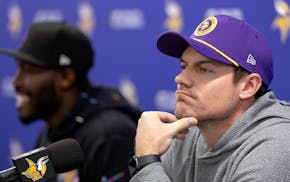Gophers football coach Jerry Kill said this week that his team's troubling academic situation is improving. Not enough to breathe easy, but apparently things are pointing in the right direction.
Their academic performance has made headlines lately, mostly in unflattering terms, starting with Kill's admission that his staff monitors more than 60 players to make sure they're going to class.
My initial reaction to that piece of news was, shame on those who treat a free education and the academic support afforded them so haphazardly. They should be required to spend 30 minutes with Mike and Marcus Sherels to gain some perspective on how to maximize an opportunity.
The two brothers from Rochester entered the Gophers program three years apart without scholarships or fanfare. One was a little slow (Mike), the other undersized (Marcus). They were promised nothing more than a walk-on opportunity. What became of that opportunity was up to them.
They eventually earned scholarships and developed into starters and team leaders, Mike at middle linebacker and Marcus as a cornerback. They were good, solid players, but not elite.
But that's only a fraction of their contribution. Both left school with a degree. In their own way, both served as ambassadors for a program that too often is used as a punch line. Both credit their experiences for opening doors they probably didn't even know existed before they arrived.
"The university has done a lot of good things for me, and I have no problem telling people that," Mike said. "The football program and the university has taught me a lot, has given me a lot. Why wouldn't I speak highly of it?"
Today, Mike is a special assistant to Kill. He oversees alumni relations and gladly handles a variety of unglamorous tasks at the bottom rung of the coaching ladder. If Kill ordered him to scrub toilets with a toothbrush, Mike would check to see whether soft or hard bristles work best.
"I'll do as much stuff as they'll let me do," he said.
The same can be said of his little brother's role with the Vikings. A week ago, Marcus served as the team's punt returner, kickoff returner and nickelback in a victory at Carolina. Not bad for a guy whose NFL prospects hovered somewhere between remote and grad school.
Undrafted rookie free agents are considered longshots. Marcus was a notch below that. He had to try out to prove he was worthy of receiving a contract.
On the first day of the tryout, he got two reps. That's right, two.
"I said, 'Well, I'll finish this out and move on with my life,' " Marcus said.
His plan to enter law school, however, got put on hold after the Vikings signed him to a contract and invited him to a minicamp. Thus started a chain reaction that has resulted in a fairly prominent role, necessitated by Antoine Winfield's neck injury and Chris Cook's legal problems.
"As hard as he's worked and as good a guy as he is and the way he presents himself, I feel like he creates his own luck," Mike said. "He's getting what's coming to him. You reap what you sow."
The Sherels brothers embraced that philosophy and understood that success is not determined solely by talent. Character counts, too.
Mike started 30 games in his career and collected 219 tackles, but he made a more lasting impression by how he conducted himself. He was a senior captain in 2007 when the Gophers went 1-11 and ranked last nationally in Division I-A in total defense. Every Tuesday, Sherels acted as a human punching bag by meeting with media members to discuss the latest embarrassment. It obviously wasn't enjoyable, but Sherels answered every question about his team's ineptitude with composure and class.
He received a note after the season from an executive of a Fortune 500 company based in the Twin Cities. The man was impressed by the way Mike represented himself and offered him a job opportunity.
"All the stories I had heard about how it was going to be when I graduated," Mike said, "that was my, 'Oh my gosh, they were right.' "
Their shared humility is a product of their upbringing. Their mother held a job and raised them alone until she remarried. Their stepfather worked an early-morning shift at a dairy plant and was a goldsmith in the afternoon.
"You see that work ethic just to make ends meet and how could you not wake up and realize that you're getting paid to play a game or getting paid to tell other people how to play a game?" Mike said. "Why wouldn't you work hard?"
Marcus said he believes his job security is only as strong as how he performs that day. He can't shed his longshot mindset.
"Every day I try as hard as possible," he said.
Mike preaches that same theme when he mentors Gophers players. His duties also include checking to make sure they're going to class.
Those players should stop and think about that sometime.
Chip Scoggins • ascoggins@startribune.com

Scoggins: Adofo-Mensah meets draft night challenge in a big way

Scoggins: Worried about costly trade to draft a quarterback? Don't be.
Scoggins: 'Wait one more year' can't be the Wild's plan. Thankfully, it isn't.


